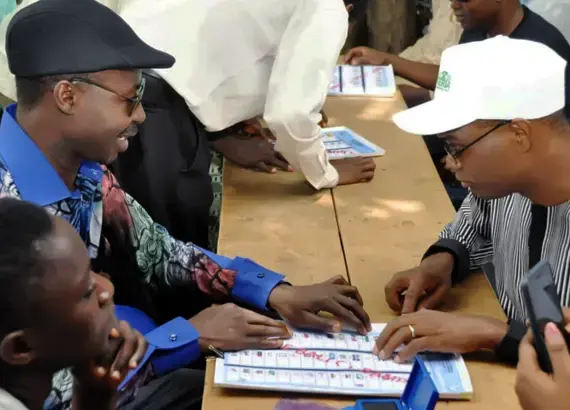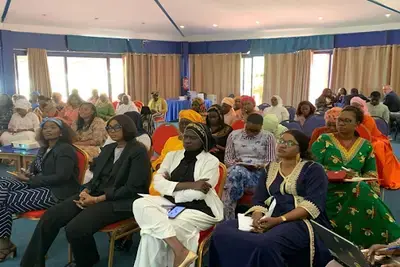
A Nigerian voter (left) tests a Braille Ballot Guide that the election management body would later adopt and pilot during elections.
Success Story
Nigerians with Visual Impairments Vote Independently for the First Time
In late 2018, one small pilot initiative in the election day process changed the story of inclusion in Nigerian democracy. For the first time ever, voters with visual impairments in Osun - a state in southwest Nigeria - cast their ballots, unassisted, using a newly developed Braille Ballot Guide. This Braille Ballot Guide was the result of tireless advocacy by Nigeria’s premier Disabled Persons Organization (DPO), Inclusive Friends Association (IFA), under their campaign, #AccessNigeria: Disability Votes Matter. After years of advocacy, pushing for greater inclusion of people with disabilities in Nigerian elections, the election management body - the Independent National Electoral Commission (INEC) - invited #AccessNigeria to co-design a Braille Ballot Guide that was then pilot tested in the Osun state gubernatorial election.
Now I feel like a complete citizen. In the previous elections, I had to depend on someone else to cast my vote... [with] the Braille Ballot Guide in place, I had the opportunity to vote independently.
- Joseph Oguniran, an Osun-based disability advocate
Prior to these elections, voters with visual impairments across Nigeria relied on someone of their choice to assist them to vote, which compromised ballot secrecy. For Nigerians with disabilities, election administrators historically did not provide assistive materials like a Braille Ballot Guide for voters with visual impairments, or other forms of reasonable accommodation to the voting process. Recognizing this and the existence of many other barriers to the full participation of people with disabilities in Nigeria, the #AccessNigeria campaign first embarked on a data collection effort. This effort included sample-based audits to ascertain polling unit accessibility during the 2016 gubernatorial elections in Nigeria’s Edo and Ondo states. The audit findings revealed that people with disabilities face barriers of enormous scale and scope in the electoral process, including the absence of any assistive material to allow voters with visual impairments to vote in secret. With the audit findings, #AccessNigeria commenced evidence-based advocacy with broad support from DPOs in Nigeria.
#AccessNigeria and its supporters engaged in sustained advocacy to INEC through one-on-one meetings and quarterly roundtable dialogues, recommending a Braille Ballot Guide. INEC complied with #AccessNigeria’s ask and piloted a Braille Ballot Guide at 89 polling stations during gubernatorial polls in Osun state. After that successful pilot, INEC followed through on #AccessNigeria’s ask for the 2019 presidential elections, and deployed the Braille Ballot Guide to nearly half of polling places in the entire country on election day. #AccessNigeria will continue working with INEC to address challenges related to the format of the guide, to ensure it can be widely used during the off-cycle governorship elections in Kogi and Bayelsa states in late 2019.
“Now I feel like a complete citizen. In the previous elections, I had to depend on someone else to cast my vote, there was no way to verify if the assistant followed my instructions or not. With the Braille Ballot Guide in place, I had the opportunity to vote independently. I’m confident that I can participate in elections by exercising my voting rights as a Nigerian citizen,” said Joseph Oguniran, an Osun-based disability advocate.
Every step of the way, NDI worked with IFA to strengthen the #AccessNigeria campaign, from identifying advocacy targets, to developing messaging and asks, to drawing the 2016 accessibility audits’ samples. "Our advocacy strategy has changed significantly. In the past, we focused only on the target, but with NDI's technical support, we now understand the importance of power mapping, issue framing, alliance building and systematic engagement with advocacy targets," said Grace Jerry, IFA’s executive director.
With this Braille Ballot Guide win by the #AccessNigeria campaign, voters with disabilities across Nigeria are starting to witness a more inclusive democracy.



